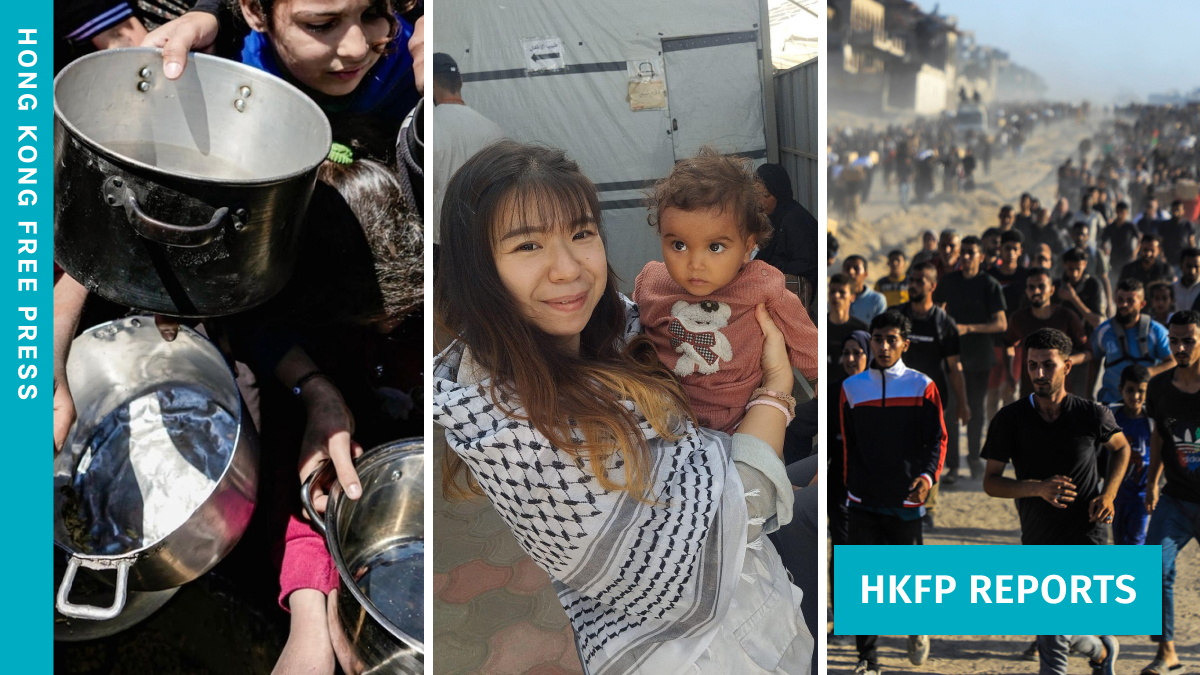Under pressure but pressing on
If you’ve never paid for news or backed a newspaper before, now is the time to help protect what remains of Hong Kong’s independent media.
Over 10 years, HKFP has published 30,000 stories, won multiple awards, launched the careers of 50 local journalists and raised over HK$35 million to fund quality, non-profit reporting.
HKFP has survived threats, visa trouble, intimidation, harassment, surveillance, censorship, media bans, government inspections, and plenty of pepper spray. Yet, as the city sees newsrooms raided, journalists jailed, and news outlets disbanded, Team HKFP has vowed to press on with on-the-ground, independent journalism.
Please consider becoming a Member, for the price of a weekly coffee – safeguard press freedom, and help guarantee HKFP’s future in the city we love.
💡 You’ve read article/s this month. Support Team HKFP – unlock 8 benefits by joining as a HK$150/month+ member. Promos disabled for members.
It was three in the morning on October 10 when Krystal So heard the news of the Gaza ceasefire agreement.
The Hongkonger was on her third deployment with medical charity Médecins Sans Frontières (MSF), which began in late July and ended in mid-October.
 Palestinians at the GHF distribution site in Netzarim. Photo: MSF.
Palestinians at the GHF distribution site in Netzarim. Photo: MSF.
In the afternoon, just hours after the news broke, the Hong Kong nurse was on the move with her team. They suddenly heard a blast from an Israeli airstrike some 200 metres from her position in southern Gaza.
The continuing attacks confirmed the Gazans’ suspicions that the fighting would not stop.
“They didn’t have strong emotions or very high expectations, because there was a ceasefire this January, but that was very short-lived,” she said at a press conference on October 22. “They didn’t know when the fighting might start again.”
The US-brokered ceasefire came two years after Israel unleashed relentless bombardments on Gaza, triggered by a surprise attack by Hamas on October 7, 2023. The militant group crossed the border into Israel, taking more than 250 hostages and killing over 1,000 people.
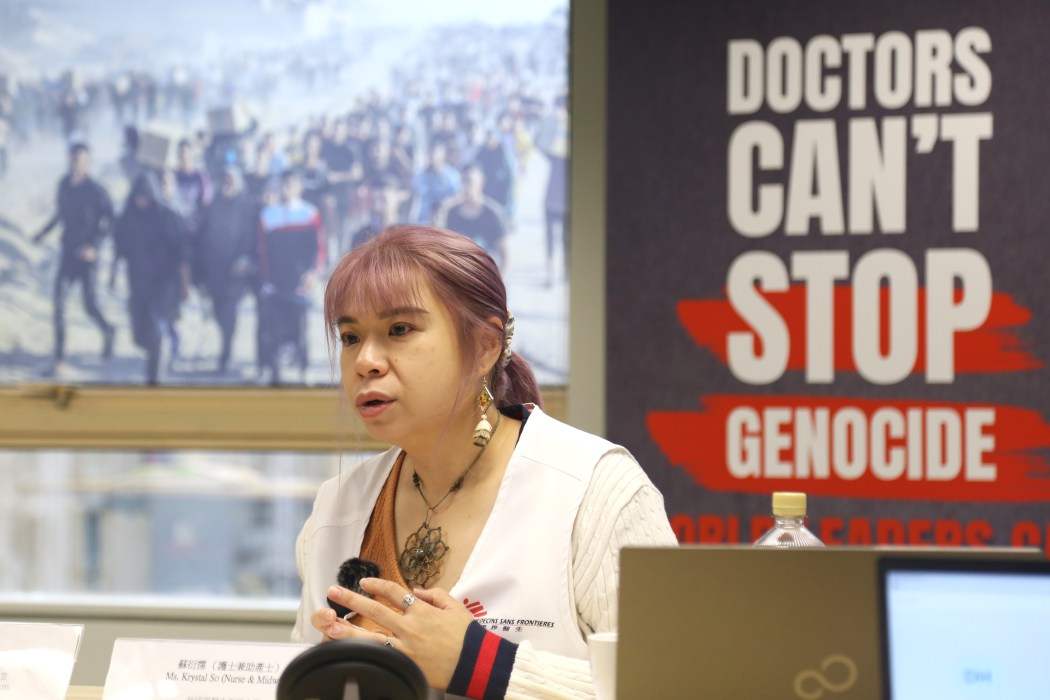 MSF nurse Krystal So speaks to reporters on October 22, 2025. Photo: MSF.
MSF nurse Krystal So speaks to reporters on October 22, 2025. Photo: MSF.
Vowing to retaliate and crush Hamas, Israel launched a scorched-earth military campaign on Gaza. More than 68,000 Palestinians have been killed since October 2023, mostly civilians.
Despite the ceasefire, both Hamas and the Israeli government have accused each other of violating the agreement. In the latest flare-up of violence, the Israeli military launched a wave of attacks on Gaza on Tuesday, killing 104 Palestinians. The attacks came after Israel accused Hamas of killing a soldier and staging the discovery of a deceased hostage.
Prior to that, on October 19, another barrage of Israeli airstrikes killed 26 people on Gaza, after two of its soldiers were killed by Hamas militants killed two Israeli soldiers.
So has been deployed to the Gaza Strip three times. The first was in May and June 2024, the second from September to November last year, and the third was from July to October this year.
So, who returned to Hong Kong on October 12, said her latest deployment was her hardest yet. She lost some colleagues, narrowly escaped an airstrike, witnessed countless civilian casualties and widespread famine. However, with the fragile truce in place, she holds a cautious hope that Israel’s onslaught will finally end.
‘Weaponised starvation’
When the MSF nurse arrived in southern Gaza on July 27, food and medical supplies were even scarcer compared with her previous deployments to the Palestinian enclave.
 Kids holding their empty pots at a community kitchen in Northern Gaza. Photo: MSF.
Kids holding their empty pots at a community kitchen in Northern Gaza. Photo: MSF.
Because of this, during her latest tour of duty, So was tasked not only with giving medical care but also with operating nutrition centres.
“Everyone was being tortured by hunger,” said So.
Many Palestinian children had turned to “skin and bone” under the aid blockade. Just a single piece of bread was cause for celebration, she said.
After the January ceasefire collapsed in March, Israel imposed even stricter limitations on food and medical supplies, at times even cutting off aid entirely. MSF issued a statement in mid-August, condemning Israel’s “weaponised starvation” of the Gazan population.
 Palestinians at an aid distribution site in Netzarim. Photo: MSF.
Palestinians at an aid distribution site in Netzarim. Photo: MSF.
Days later, United Nations-backed experts declared that Israel’s war pushed Gaza City and its surrounding area into a “man-made” famine.
See also: Pro-Palestinian rally in Hong Kong calls for ceasefire, condemns Israel’s war on Gaza
On top of that, there was a forced mass displacement of Gaza City to the southern part of the Palestinian territory in September. It caused severe overcrowding, putting further strain on health services, So said.
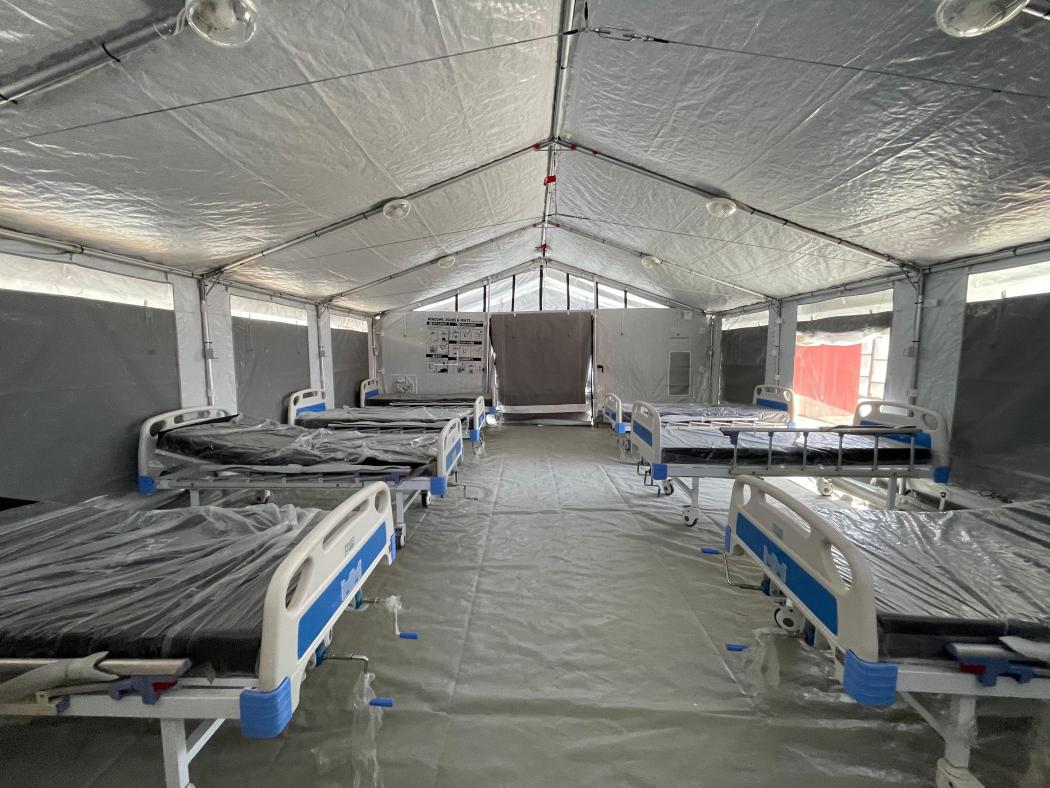 An MSF nutrition centre set up to optimise aid supplies. Photo: MSF.
An MSF nutrition centre set up to optimise aid supplies. Photo: MSF.
Each primary health clinic operated by MSF receives more than 3,000 consultations every week. “But we only had dressing materials for 200 patients each week,” she said.
With aid being severely limited, So and other MSF medics had to seek out substitutes, meticulously calculating calories and nutrients to optimise what they could use. They also cut up napkins and cloth as makeshift bandages, which were also in extremely limited supply.
‘Calculated genocide’
Since Israel began to block UN organisations from entering Gaza in March, aid operations are carried out by the Gaza Humanitarian Foundation (GHF), a US- and Israel-backed NGO.
 MSF’s Al Mawasi health centre receives patients after Israeli forces opened fire on people in one of the GHF distribution sites. Photo: MSF.
MSF’s Al Mawasi health centre receives patients after Israeli forces opened fire on people in one of the GHF distribution sites. Photo: MSF.
However, hundreds of Palestinians have been killed by Israeli forces in the vicinity of GHF-operated aid distribution sites, raising questions about the NGO’s presence.
“The GHF-run food distributions in Gaza, Palestine, have become sites of ‘orchestrated killing and dehumanisation,’ not humanitarian aid,” MSF said.
So was stationed at two clinics in the vicinity of the GHF aid sites in southern Gaza. She helped treat gunshot wounds and blast injuries sustained by Palestinians waiting for aid.
Many of those incidents were reported as mass casualties, she said. “It became a human experiment, a game.”
 A bloodstained backpack belonging to a civilian admitted at MSF health centre in Al Mawasi, who was injured while trying to get food at the GHF distribution site. Photo: MSF.
A bloodstained backpack belonging to a civilian admitted at MSF health centre in Al Mawasi, who was injured while trying to get food at the GHF distribution site. Photo: MSF.
At the same press conference, MSF Hong Kong’s head of communications, Ashley To, said that one in every four pregnant or nursing women in Gaza was affected by malnutrition, leading to increased rates of stillbirths, miscarriages, and premature birth.
“This is a calculated genocide at the hands of the Israeli government,” To said. She pointed to an independent United Nations (UN) inquiry’s findings in September, concluding for the first time that Israel has committed genocide against Palestinians in Gaza.
So narrowly escaped an Israeli double-tap airstrike on Al Nasser Hospital in late August, killing 20 people, including journalists and health care workers.
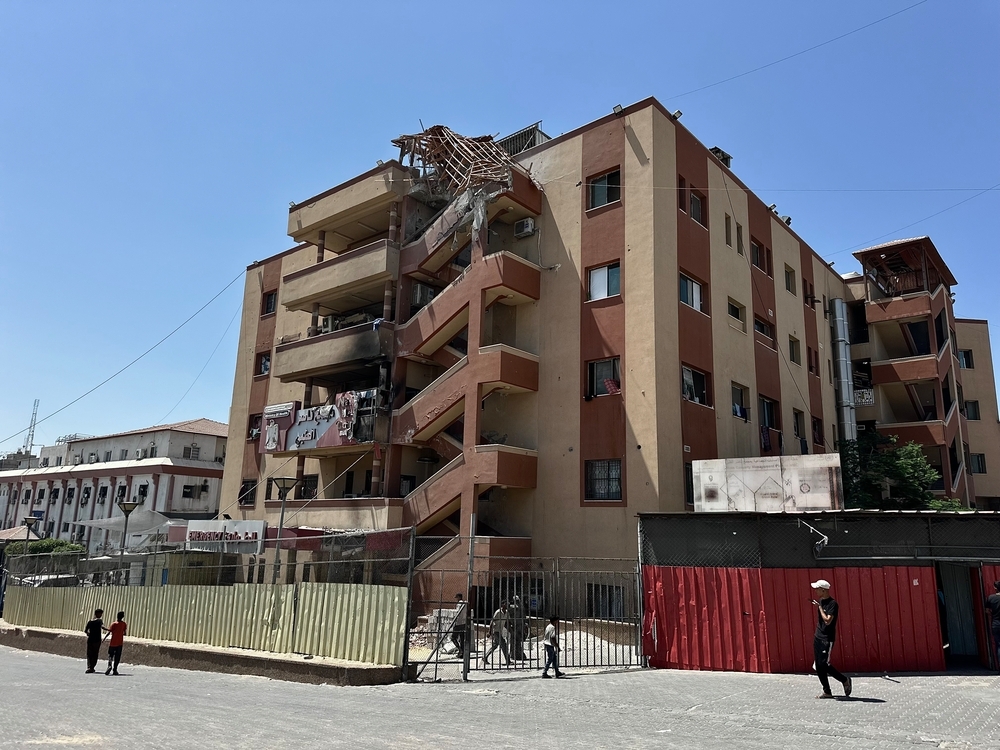 An Israeli double attack on Al Nasser Hospital on August 25 killed at least 20 people and injured 50 more. Photo: MSF.
An Israeli double attack on Al Nasser Hospital on August 25 killed at least 20 people and injured 50 more. Photo: MSF.
At the time, she was in the hospital complex, though not in the main building destroyed by the attack.
After the airstrike, So stepped into the main building and saw a ward filled with babies less than half a year old with severe burn wounds and missing teeth and fingers, and a severely overcrowded neonatal intensive care unit with three newborn infants crammed into each incubator.
“Normally I’m very resistant to the crying… but I couldn’t take it anymore after 30 minutes,” the nurse said. “I felt ashamed in that moment, that we had allowed the world, allowed Israel to attack those innocent babies… After two years in an active war zone, they’ve already lost their childhood.”
So, who also helped deliver babies in Gaza, recalled how mothers tried to shield their children from the horrific realities of war.
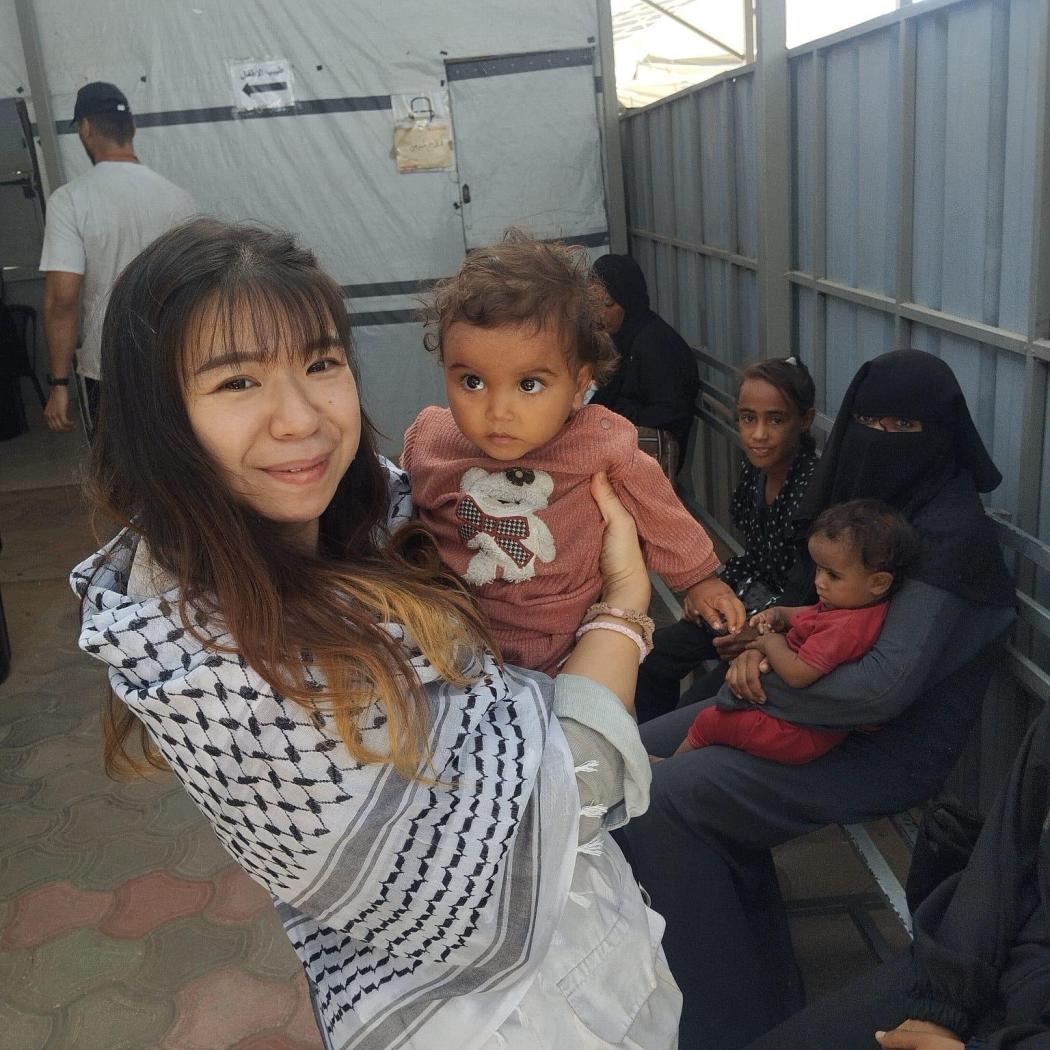 MSF nurse Krystal So with a baby. Photo: MSF.
MSF nurse Krystal So with a baby. Photo: MSF.
“They would tell the children that the sound of bombing was fireworks,” she said. “Meanwhile, all the infrastructure has been destroyed, all the schools and the buildings. Many of them have never been to school and have never been to a restaurant.”
“We should never allow war to happen again in this world,” she said. Off the top of her head, the nurse paraphrased lines from “The War Will End,” a poem by the late Palestinian writer Mahmoud Darwish.
The war will end
The leaders will shake hands
The old woman will keep waiting for her martyred son
That girl will wait for her beloved husband
And those children will wait for their heroic father
I don’t know who sold our homeland
But I saw who paid the price.
Fallen colleagues
So lost several colleagues during her third deployment.
Photojournalist Miriam Abu Dagga, who worked for MSF and news outlets like the Associated Press, was among the five journalists killed in the airstrike on Al Nasser Hospital.
Dagga, 33, took some of the most memorable photos of So working in the hospital’s maternity and paediatric wards.
 Krystal So checks on a newborn baby at Al Nasser Hospital in southern Gaza. Photo: Mariam Abu Dagga/MSF.
Krystal So checks on a newborn baby at Al Nasser Hospital in southern Gaza. Photo: Mariam Abu Dagga/MSF.
The Hongkonger also worked alongside two MSF occupational therapists, Abed El Hameed Qaradaya and Omar Hayek, who died in an Israeli attack on October 2, just days before the ceasefire announcement.
Qaradaya, 43, and Hayek, 42, were killed while waiting for a bus to go to work. Their deaths bring the tally of MSF staff members killed in Gaza to 15.
“Abed and Omar left Gaza City following evacuation orders and relentless attacks by Israeli forces, only to be killed by those same forces in what was described as a ‘safer zone’. There is no safe place in Gaza,” MSF said in a statement last month.
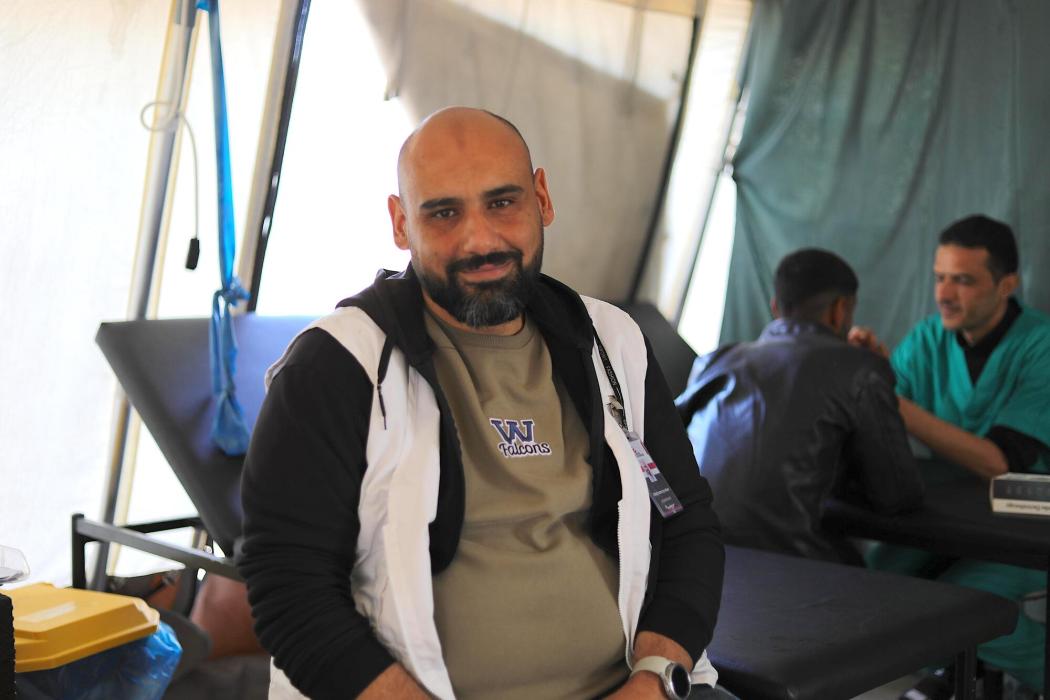 MSF occupational therapist Abed El Hameed Qaradaya, who was killed in an Israeli strike in October 2025. Photo: MSF.
MSF occupational therapist Abed El Hameed Qaradaya, who was killed in an Israeli strike in October 2025. Photo: MSF.
So praised her late colleagues, saying: “They were both passionate, professional medical workers.”
While working in Gaza, So frequently saw Dagga, Qaradaya and Hayek. “We became more than just colleagues – we were companions,” she recalled.
“Sometimes I’ll think to myself that they could’ve seen the ceasefire if they just held on. Their deaths are a great loss, not only to Gaza’s medical system, but also to MSF and the rest of the world.”
Support HKFP | Policies & Ethics | Error/typo? | Contact Us | Newsletter | Transparency & Annual Report | Apps
Safeguard press freedom; keep HKFP free for all readers by supporting our team

